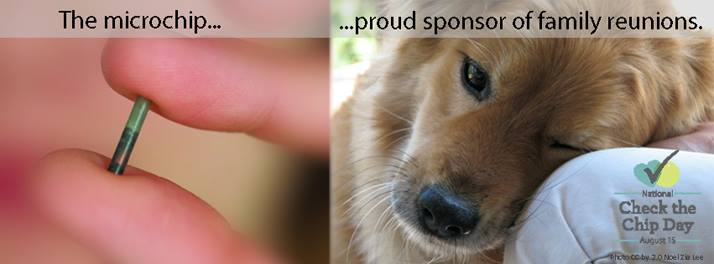Happy Check the Chip Day! I’m talking about pet identification microchipping, the most important step you can take to ensure your pet gets home to you if he ever goes missing.
Some of you may be old enough to remember pay phones. A few of you may, like me, be old enough to remember when a local phone call cost ten cents. (Yes, that’s old!)
Back in those days, I remember animal control distributing posters to local veterinarians that showed a dog sitting in front of a phone booth, with the caption, “Your pet’s license: A phone call home for a dog without a dime.”
While I recommend collars with ID for all my patients, and use them on my pets, collars can fall off or be removed. A microchip as backup to an ID tag is truly the modern version of that phone call home.
That’s why today, Aug. 15, is “Check the Chip Day,” started by the American Veterinary Medical Association (AVMA) to encourage pet owners to get their pets microchipped, and make sure their pet’s microchip registry information is current.
There’s some confusion out there about microchips. One misconception is that you have to pay to maintain your registry information. That’s not true; the initial registration data is kept permanently for no additional cost.
Some registries offer additional services for a monthly fee, but just keeping track of your pet’s ID number and your contact information is not going to cost you anything down the road.
The other concern is that microchips might cause cancer or other disease. I “never say never,” but the chances a microchip will get you and your pet back together if he ever goes missing are far greater than the chances he will suffer ill effects from a microchip. From the AVMA:
A study of more than 7,700 stray animals at animal shelters showed that dogs without microchips were returned to their owners 21.9% of the time, whereas microchipped dogs were returned to their owners 52.2% of the time. Cats without microchips were reunited with their owners only 1.8% of the time, whereas microchipped cats went back home 38.5% of the time. (Lord et al, JAVMA, July 15, 2009) For microchipped animals that weren’t returned to their owners, most of the time it was due to incorrect owner information (or no owner information) in the microchip registry database – so don’t forget to register and keep your information updated.
[…]
The British Small Animal Veterinary Association (BSAVA) maintains a database of adverse reactions to microchips. Since the database was started in 1996, over 4 million animals have been microchipped and only 391 adverse reactions have been reported. Of these reactions, migration of the microchip from its original implantation site is the most common problem reported. Other problems, such as failure of the microchip, hair loss, infection, swelling, and tumor formation, were reported in much lower numbers. For a chart summarizing the BSAVA reports, read the AVMA’s literature review on Microchipping of Animals.
So make today the day you get your pet microchipped if you haven’t already done it, and update your registry information if you have!


